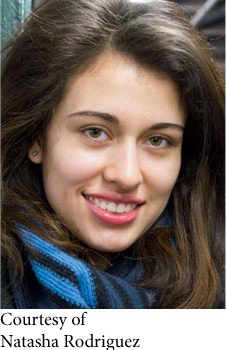Who Are You Calling Underprivileged?
Who Are You Calling Underprivileged?
NATASHA RODRIGUEZ

I have come to loathe the word “underprivileged.” When I filled out my college applications, I checked off the Latino/Hispanic box whenever I was asked to give my ethnicity. My parents in turn indicated their income, hoping that we would qualify for financial aid. But while I waited for acceptances and rejections, several colleges I was considering sent me material that made me feel worthless rather than excited about attending those institutions.
The first mailing I received was a brochure that featured a photograph of African-American, Asian, and Latino teens standing around in a cluster, their faces full of laughter and joy. The title of the brochure was “Help for Underprivileged Students.” At first I was confused: “Underprivileged” was not a word that I associated with myself. But there was the handout, with my name printed boldly on the surface.
The author questions the connotations of underprivileged.
The text went on to inform me that, since I was a student who had experienced an underprivileged life, I could qualify for several kinds of financial aid and scholarships. While I appreciated the intent, I was turned off by that one word — “underprivileged.”
I had never been called that before. The word made me question how I saw myself in the world. Yes, I needed financial aid, and I had received generous scholarships to help me attend a private high school on the Upper East Side of New York. Surely that didn’t mean that I had lived a less-privileged life than others. My upbringing had been very happy.
The author then gives a standard definition for underprivileged and explains why she refuses the label.
What does “underprivileged” actually mean? According to most dictionaries, the word refers to a person who does not enjoy the same standard of living or rights as a majority of people in a society. I don’t fit that definition. Even though my family does not have a lot of money, we have always had enough to get by, and I have received an excellent education.
What angered me most about the label was why colleges would ever use such a term. Who wants to be called underprivileged? I’m sure that even those who have had no opportunities would not want their social status rubbed in their faces so blatantly. People should be referred to as underprivileged only if they’re the ones who are calling themselves that.
Misfortune, like beauty, is in the eye of the beholder. It’s not appropriate to slap labels on people that they might not like or even agree with. Social research has found that those who are negatively labeled usually have lower self-esteem than others who are not labeled in that way. So why does the label of “underprivileged” persist?
Most colleges brag about the diversity of their students. But I don’t want to be bragged about if my ethnicity is automatically associated with “underprivileged.” Several colleges that had not even received information on my parents’ finances just assumed that I was underprivileged because I had checked “Latino/Hispanic” on their applications.
The author examines the assumptions colleges make based on ethnicity and income.
That kind of labeling has to stop. Brochures and handouts could be titled “Help for Students in Need” rather than “Help for Underprivileged Students.” I am sure that many people, myself included, are more than willing to admit that they require financial aid, and would feel fine about a college that referred to them as a student in need.
The essay concludes with the author’s own self-definition.
That’s a definition I can agree with. I am a student in need; I’m just not an underprivileged one.
Natasha Rodriguez is a student at Sarah Lawrence College, where she edits the features section of her school newspaper, the Phoenix.